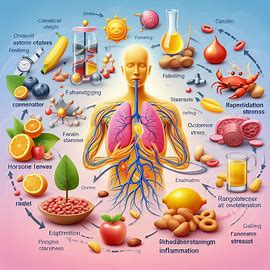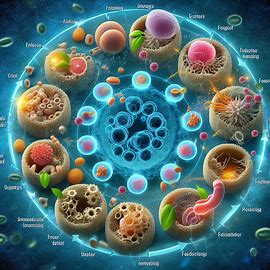Ramadan Fasting: A Journey of Spiritual Growth, Physical Well-being, and Community Connection
- Ramadan fasting, Spiritual significance of Ramadan, Health benefits of Ramadan fasting Ramadan and community, Ramadan traditions, Taraweeh prayers, Zakat (charity),
- Ramadan Iftar, Ramadan Suhoor, Fasting and Islam, Ramadan, Islam, Muslim culture, Fasting, Religion, Health, Community, Spirituality
Introduction: Ramadan, the ninth month of the Islamic lunar calendar, transcends the act of mere abstinence from food and drink. It is a multifaceted spiritual odyssey, a period of profound self-reflection, and a cornerstone of Muslim community life. Fasting during Ramadan, a core tenet of Islam’s Five Pillars offers a unique opportunity for Muslims to embark on a transformative journey that nourishes the soul, strengthens the body, and fosters a deeper connection with their faith and fellow human beings.

1 . Historical and Religious Context of Ramadan Fasting
- Commemoration: Muslims believe the Quran’s first verses were revealed to Prophet Muhammad (ﷺ) during Ramadan. Fasting honors this momentous event and reaffirms commitment to Islamic teachings.
- Second Pillar of Islam: Fasting is the second pillar of Islam’s Five Pillars, alongside faith, prayer, charity, and pilgrimage. These practices form the core of Muslim life, guiding believers toward a deeper connection with God (Allah).
- Month of Revelation: Honoring the Quran’s Descent
- Terminology: While Ramadan is associated with the Quran’s revelation, “Descent” isn’t a commonly used term in this context. Muslims often refer to the “first revelation” or “beginning of Quranic revelation.”
3 . From the Quran
- Surah Al-Baqarah, 2:183: “O you who have believed, decreed upon you is fasting as it was decreed upon those before you that you may become righteous.” (This verse establishes the obligation of fasting during Ramadan for all believers.)
4 . From the Ahadith
- Prophet Muhammad (ﷺ) said: “Allah (SWT) says: ‘Every good deed of Adam’s son is for him except fasting; it is for Me and I shall reward for it.’ Verily, the smell of the mouth of a fasting person is better to Allah than the smell of musk.” (Sahih Bukhari) (This Hadith emphasizes the special status of fasting and the immense reward promised by Allah (SWT) for those who observe it sincerely.)
- Prophet Muhammad (ﷺ) said: “There are two joys for the fasting person: one at the time of breaking his fast, and the other at the time of meeting his Lord. Allah (SWT) “(Sahih Bukhari) (This Hadith highlights the happiness associated with Ramadan, both in this life and the hereafter.)
- Prophet Muhammad (ﷺ) said: “رمضان (Ramadan) has come to you – a blessed month, in which Allah (SWT) covers you with His favor and pours His mercy upon you, and forgives your faults and accepts your repentance, so strive for excellence in the worship of your Lord. Whoever draws near to Allah (SWT) during this month with a single good deed will receive the reward of a wajib (obligatory) deed performed at other times, and whoever performs an obligatory deed will receive the reward of seventy such deeds performed at other times.” (Ibn Majah) (This Hadith motivates Muslims to make the most of Ramadan by increasing their good deeds.)
- Prophet Muhammad (ﷺ) said: “Whoever fasts during Ramadan with faith and seeking reward from Allah, all his previous sins will be forgiven.” (Sahih Bukhari) (Highlights the spiritual significance of Ramadan as a time for forgiveness and renewal.)
5 . The Essence of Ramadan Fasting: A Pillar of Islam
Fasting during Ramadan holds immense historical and religious significance. According to Islamic tradition, it was during this sacred month that the first verses of the Quran were revealed to Prophet Muhammad (PBUH). By observing the fast, Muslims commemorate this momentous event and reaffirm their commitment to the teachings of Islam. Fasting also serves as the second pillar of Islam’s Five Pillars, a set of core practices that define the religion’s foundation. These pillars, including Faith (Shahadah), Prayer (salat), Charity (zakat), and Pilgrimage (hajj), form the bedrock of Muslim life and guide believers toward a deeper connection with God Allah (SWT)
6 . A Spiritual Odyssey: Unveiling the Inner Depths during Ramadan
The essence of Ramadan fasting extends far beyond simply abstaining from food and drink. It is a period dedicated to cultivating self-discipline, a cornerstone of the Islamic faith. By abstaining from worldly pleasures, Muslims practice taqwa, a heightened sense of God-consciousness. This heightened awareness fosters a deeper connection with Allah and encourages believers to align their thoughts and actions with Islamic principles. Ramadan also serves as a time for introspection and spiritual growth. Muslims devote increased attention to prayer, reciting the Quran, and engaging in acts of charity (zakat). This focus on spiritual pursuits allows individuals to cleanse their souls, seek forgiveness, and emerge from Ramadan a more refined version of themselves.
7 . Beyond the Physical: Unveiling the Health Benefits of Ramadan Fasting
While the spiritual significance reigns supreme, Ramadan fasting offers a surprising array of health benefits. The act of abstaining from food for an extended period can trigger a metabolic transformation within the body. This temporary shift in dietary patterns can be likened to a detoxification period, allowing the body to cleanse itself of accumulated waste products.
Furthermore, Ramadan fasting cultivates resilience and self-control. By resisting the urge to eat and drink during daylight hours, Muslims strengthen their willpower and develop a heightened sense of discipline. Studies have also suggested that Ramadan fasting may positively impact weight management and blood sugar control, potentially offering benefits for individuals with pre-existing metabolic conditions. It is crucial to note that these potential benefits are contingent upon maintaining a balanced diet during permitted eating hours.
8 . Embracing the Spiritual Significance of Ramadan Fasting
Embracing the Spiritual Significance of Ramadan Fasting explores how the act of fasting transcends physical limitations. Here’s a breakdown:
- Self-Discipline and Taqwa: It emphasizes cultivating self-control and God-consciousness (taqwa) by abstaining from worldly pleasures. This fosters a deeper connection with Allah and aligns actions with Islamic principles.
- Spiritual Growth: It highlights Ramadan as a time for introspection, increased prayer, Quran recitation, and acts of charity (zakat). These practices cleanse the soul, seek forgiveness, and lead to a spiritually enriched state.
9 . Cultivating Taqwa: Deepening God-Consciousness
Ramadan fasting serves as a potent catalyst for cultivating taqwa, an Arabic term often translated as God-consciousness. It signifies a heightened awareness of Allah’s presence in every aspect of life. This section will delve into how Ramadan fosters a deeper sense of taqwa:
- Detachment from Worldly Desires: By abstaining from food and drink, Muslims experience a sense of detachment from material desires. This temporary deprivation allows them to focus on their spiritual connection with Allah, unburdened by worldly preoccupations.
- Mindful Actions and Increased Self-Control: Fasting during Ramadan demands constant awareness of one’s actions. Muslims strive to avoid not just consuming food and drink, but also negative thoughts, gossip, and harmful behaviors. This heightened self-control translates into a more mindful and God-conscious approach to daily life after Ramadan.
- Gratitude and Appreciation: The act of breaking the fast each evening, a joyous occasion called Iftar, serves as a powerful reminder of Allah’s blessings. This daily experience cultivates a profound sense of gratitude and appreciation for the simple joys in life, further strengthening the connection with the Divine.

Gratitude and Appreciations - Increased Focus on Prayer and Charity: Ramadan traditionally witnesses a surge in prayer and acts of charity (zakat). Muslims devote more time to reciting the Quran, performing Taraweeh prayers (night prayers specific to Ramadan), and offering Zakat to those in need. These acts of worship and generosity bring them closer to Allah and solidify their commitment to Islamic principles.
Through these experiences, Ramadan becomes a training ground for cultivating taqwa. The lessons learned and the spiritual connection established during this holy month translate into a more mindful and God-conscious approach to life throughout the year.
10 . Fostering Empathy: Sharing the Experience of Hunger
Here’s a concise explanation of Fostering Empathy: Sharing the Experience of Hunger:
- Understanding Hunger’s Impact: Fasting allows Muslims to experience hunger firsthand, fostering a deeper understanding of the challenges faced by those who are less fortunate and struggle with food insecurity.
- Heightened Compassion and Generosity: This newfound empathy motivates Muslims to increase acts of charity (zakat) during Ramadan. They become more inclined to donate food and support initiatives that address hunger within their communities.
- Building Bridges and Community Cohesion: By sharing the experience of hunger, Muslims develop a sense of solidarity with those in need. This fosters a more compassionate and supportive community environment.
- Amplifying Gratitude: Appreciating Blessings: Ramadan serves as a powerful catalyst for amplifying gratitude and fostering a deeper appreciation for life’s blessings. Here’s a breakdown of how this occurs:
- Breaking the Fast: A Daily Reminder: The daily ritual of breaking the fast, known as Iftar, is a joyous occasion marked by shared meals with family and community. This act of coming together after a period of abstinence serves as a potent reminder of Allah’s provision and the simple joys of life, such as good health, food, and loved ones.
- Shifting Perspective: By abstaining from necessities like food and drink, Muslims gain a renewed appreciation for these blessings that are often taken for granted. This temporary deprivation allows them to view these provisions with a newfound sense of gratitude.
- Focus on Charity (Zakat): Ramadan is traditionally a time of increased focus on charity (zakat). By giving back to those less fortunate, Muslims express their gratitude for their blessings and fulfill their religious obligation. This act of generosity not only benefits the recipients but also fosters a sense of humility and gratitude in the giver.
Through these experiences, Ramadan cultivates a lasting sense of gratitude that extends beyond the holy month. Muslims emerge with a heightened appreciation for life’s blessings and a stronger commitment to sharing their good fortune with others.
- 11. Unveiling the Physical Benefits of Ramadan Fasting
While the spiritual significance reigns supreme, Ramadan fasting offers a surprising array of potential health benefits. Here’s a quick explanation:
- Metabolic Transformation: Abstaining from food for an extended period can trigger a metabolic shift within the body. This temporary change can be likened to a detoxification period, potentially allowing the body to cleanse itself of accumulated waste products.
- Building Resilience: The act of fasting cultivates self-control and resilience. By resisting the urge to eat and drink during daylight hours, Muslims strengthen their willpower and develop a heightened sense of discipline. This newfound resilience can translate into healthier lifestyle choices beyond Ramadan.

Ramadan Myths - Potential for Weight Management and Blood Sugar Control: Studies suggest that Ramadan fasting may positively impact weight management and blood sugar control. However, it’s crucial to maintain a balanced diet during permitted eating hours to maximize these potential benefits.
It’s important to remember that these are potential benefits, and individual experiences may vary. Consulting a healthcare professional before undertaking any significant dietary changes, especially during Ramadan, is crucial.
- A Natural Detoxification Process: Cleansing the Body: While the concept of detoxification can be trendy, it’s important to acknowledge that the human body has a remarkable built-in detoxification system. However, Ramadan fasting can potentially enhance this natural process in a few ways:

Reducing Inflammation and Oxidative Stress - Reduced Digestive Workload: When we abstain from food and drink, our digestive system gets a much-needed break. This allows the body to focus on other crucial functions, potentially facilitating the elimination of waste products that may have accumulated in the digestive tract.
- Cellular Cleanup: During a fasted state, the body may enter a process called autophagy, where it literally “cleans house” at a cellular level. Autophagy involves the breakdown and recycling of damaged or unwanted cellular components, potentially contributing to overall cellular health.
It’s important to note that the scientific evidence on the specific detoxification benefits of Ramadan fasting is still emerging. However, the potential for a “cleansing” effect, combined with the other health benefits, adds another dimension to the multifaceted experience of Ramadan.
- Metabolic Regulation: Enhancing Insulin Sensitivity: Beyond potential detoxification benefits, Ramadan fasting may offer advantages in terms of metabolic regulation. Here’s a simplified explanation:
- Shifting Fuel Sources: When we don’t consume food for an extended period, the body switches its primary fuel source from glucose (derived from carbohydrates) to stored fats. This metabolic shift can lead to improved insulin sensitivity, which is the body’s ability to utilize insulin effectively for regulating blood sugar levels.
- Potential Benefits for Blood Sugar Control: Improved insulin sensitivity may translate to better blood sugar control, potentially offering benefits for individuals with prediabetes or type 2 diabetes. However, it’s crucial to remember that these potential benefits are contingent on maintaining a healthy diet during permitted eating hours.
It’s important to consult with a healthcare professional before undertaking any significant dietary changes, especially for individuals with pre-existing metabolic conditions. They can offer personalized guidance to ensure a safe and healthy Ramadan fasting experience.
- Weight Management: Fostering Healthy Eating Habits Ramadan fasting, when combined with mindful dietary practices, can offer potential benefits for weight management. Here’s a breakdown:
- Calorie Restriction: Abstaining from food and drink for a significant portion of the day naturally leads to a reduction in calorie intake. This calorie deficit can contribute to weight loss, especially if maintained throughout Ramadan and beyond.
- Shifting Focus to Nutrient-Dense Choices: During permitted eating windows (Suhoor and Iftar), Muslims have the opportunity to make conscious choices about their meals. Focusing on nutrient-dense foods like fruits, vegetables, whole grains, and lean protein can help ensure they feel satiated and avoid overindulging in processed foods or sugary drinks.
- Developing Sustainable Habits: The discipline and self-control cultivated during Ramadan can translate into healthier eating habits that extend beyond the holy month. By practicing mindful portion control and prioritizing nutritious choices, Muslims can develop sustainable dietary patterns that support long-term weight management goals.
It’s important to remember that individual weight loss experiences may vary. Factors like overall health, activity level, and dietary choices during Suhoor and Iftar will all play a role. Consulting a registered dietitian or healthcare professional can offer personalized guidance for those seeking to optimize their Ramadan experience for weight management.
12 . A Mind-Body Connection: Sharper Focus and Clarity

The benefits of Ramadan fasting extend beyond the physical realm, potentially influencing cognitive function and mental clarity. Here’s a glimpse into this mind-body connection:
- Reduced Cognitive Load: By abstaining from food and drink, the body redirects energy away from digestion towards other functions, potentially including cognitive processes. This reduced “digestive burden” may lead to improved focus and sharper mental clarity.
- Enhanced Brain Function: Some studies suggest that fasting may stimulate the production of brain-derived neurotrophic factor (BDNF), a protein crucial for neuronal growth and repair. Increased BDNF levels can potentially enhance memory, learning, and overall cognitive function.
- Improved Mental Discipline: The act of fasting during Ramadan demands a high degree of self-control and discipline. This mental fortitude can translate into improved focus and concentration throughout the day, even during times of temptation or distraction.
It’s important to note that research on the cognitive benefits of Ramadan fasting is still ongoing. However, the potential for enhanced mental clarity and focus adds another layer to the multifaceted experience of this holy month.
14 . Fostering Community Spirit through Taraweeh Prayers (Night Prayers)
- Shared Experience: Muslims gather for Taraweeh prayers throughout Ramadan, creating a powerful sense of shared experience and community.
- Social Connection: These nightly prayers provide opportunities to socialize with fellow Muslims, strengthening bonds and fostering a spirit of unity.
15 . Charitable Giving (Zakat) and Social Cohesion
- Increased Generosity: Ramadan traditionally witnesses a surge in Zakat (obligatory charity). This act of giving strengthens social cohesion by supporting those in need within the community.
- Building Bridges: Zakat fosters a sense of responsibility towards others, creating a more compassionate and supportive social environment.
16 . Embracing Ramadan Fasting: Considerations and Guidelines
This section will delve deeper into practical aspects of observing the fast, including:
- Who should observe the fast (healthy adults) and exemptions for children, the elderly, pregnant women, and those who are ill.
- Essential preparations for a meaningful Ramadan, such as setting intentions and planning meals for Suhoor and Iftar.
- Maintaining health during the fast through proper hydration and dietary strategies.
Frequently Asked Questions (FAQs) About Ramadan Fasting
Q 1. Do Muslims have to give up everything during Ramadan?
A . While Muslims abstain from food and drink during daylight hours, they can still engage in most daily activities. Smoking, sexual activity, and negative behaviors like gossip or anger are also discouraged during Ramadan.
Q 2. Can I eat with my Muslim friends during Ramadan?
A . It is completely acceptable to eat and drink around your Muslim friends during their fasting hours. However, they may politely decline offers out of respect for their fast. If you’d like to share a meal, consider inviting them to break their fast with you at Iftar, the evening meal.
Q 3. How can I be supportive of my Muslim friends during Ramadan?
A . Simple gestures of understanding and respect go a long way. Avoid offering them food or drink during fasting hours. You can offer words of encouragement or invite them for Iftar meals after sunset.
Q 4. Is it okay to wish someone a happy Ramadan?
A . Absolutely! Wishing someone a “Ramadan Mubarak” (Blessed Ramadan) is a thoughtful gesture that will be appreciated.
Q 5. Is Ramadan the same as Eid al-Fitr?
A . Ramadan is the month of fasting, while Eid al-Fitr is the celebratory feast that marks the end of Ramadan. It’s a joyous occasion filled with feasting, gift-giving, and family gatherings.
Conclusion: A Transformative Experience Beyond Religion:
It goes beyond just abstaining from food and drink, fostering spiritual growth, physical well-being, and a deeper sense of community. The lessons learned and experiences shared during Ramadan can have a lasting impact, enriching lives beyond the holy month itself.
ibtimes.co.in/eid-mubarak-best-quotes-wishes-images-sms-quran-verses-share-eid-al-fitr-798899


Very nice 👍